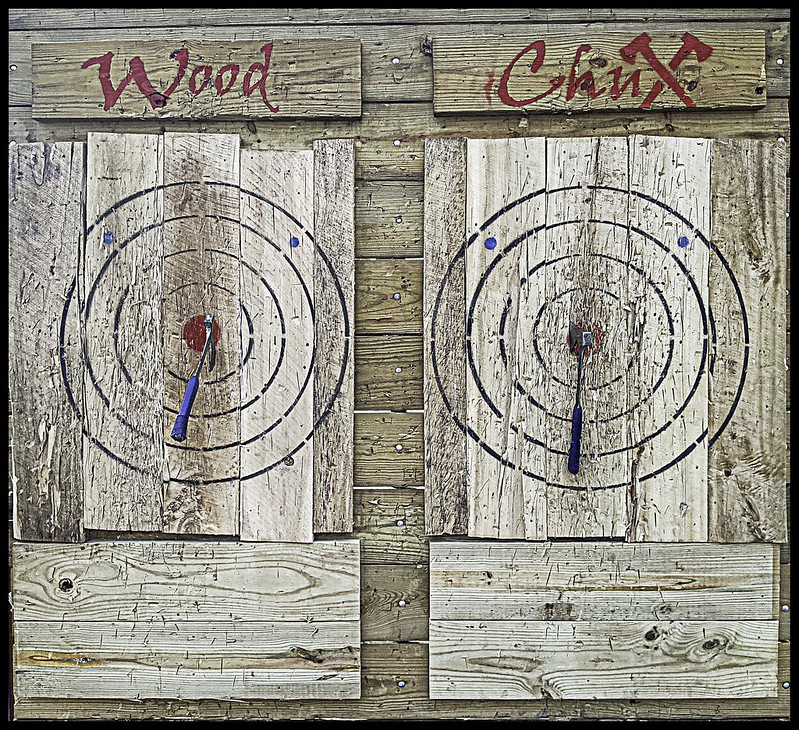Recovering from being wrong: the expertise trap
We have met the enemy and he is us

A few weeks ago it was my birthday—yes, thank you, thanks, that’s okay, I didn’t get you anything either—and my brother took me to a local axe throwing bar. After a bit of training, we were left with our axes and a throwing cage. After I sank the axe into the target on my very first throw, though, I spent the next half hour repeatedly trying, and failing, to repeat that feat. The axe kept hitting handle first, or backwards, or flying right into the ground. I just couldn’t seem to find the right technique, and my increasing frustration wasn’t helping. Finally my brother (who, by the way, took to it immediately) suggested I start throwing with my other hand. I’m left handed, so I gave it a try with my right hand. Bang, almost a bullseye. For the rest of our time there I threw with my off hand, and nearly every time my throw was on target. What happened?
Well, after my brother and I both stopped laughing, I realized it came down to two things: one physical, one mental. On the physical side, my right arm is just different from my left: it’s not accustomed to doing fine motor things, but it is probably somewhat stronger since I tend to pick up my preschooler with that arm. So that helps with the strength of the throw, but also with not overthinking it. Unlike my left arm, where I was constantly making minute adjustments to my angle, and grip, and speed, I just hauled off and threw with my right arm. And this brings me to the second difference, the mental one. I had high expectations for my left arm, and repeatedly failing with it was demoralizing. My right arm, on the other hand, didn’t have any of those expectations. I didn’t expect to succeed, so I didn’t worry about failure, and perhaps ironically that’s what let me succeed.
The expertise trap
So why did I share this story? Following on from last week’s post about being wrong, I wanted to spend a little more time talking about what stands in the way of admitting fault and moving on from there. One of the biggest barriers is that concept of presumed expertise that can trip up even the most experienced support engineer. If we were to think consciously about it, I think the reasoning would go something like this:
I usually know what I’m talking about
Because I usually know what I’m talking about, people see me as someone with expertise
My perceived expertise permits me to accomplish things more effectively
(Mistake is made)
Oh no, now 1 is called into question
Therefore 2 is also called into question
Therefore 3 is no longer something I can count on
Therefore I need to conceal that mistake, or convince myself it wasn’t a mistake, or…
Now probably nobody actually has these explicit thoughts. But even if it stays at the unconscious level, anything that calls your expertise in question is a problem for this perception of expertise. But here’s the thing—it’s more of a self-image than anything else. One mistake isn’t going to make people doubt your expertise, especially if you own up to it and correct it as soon as you can. All it’s going to tell your customers is that you’re human, but an honest one. And that’s a good reputation to have.
What will harm your reputation for expertise is if you don’t own up to your mistakes, and the customer inevitably discovers that you misled them and never corrected the record. They may not bring it up, but they’ll remember it the next time you tell them something unexpected or ask them to do something difficult. They’ll be that more likely to push back, and your job will be harder with that customer until you’re able to rebuild that trust and reputation for reliability.
Going back to my axe-throwing story, imagine if I thought this way:
My left arm is better than my right at everything
Because of 1, I know how to accomplish physical tasks
(Misses dozens of throws in a row)
Oh no, 1 is called into question
Therefore 2 is called into question
I’d better double down on what I’m doing to prove 1 is true so I don’t start doubting 2
Pretty silly, right? If I weren’t able to get out of my own way enough to try something different, I’d probably still be in that throwing cage, fruitlessly trying to hit the target with left-handed throws.
All of this is a long-winded way of saying: don’t double down on your mistakes, or try to downplay them. Avoid the expertise trap by reminding yourself that you have a choice between getting things right or being seen, incorrectly, as right. It’s always better to choose the first option.